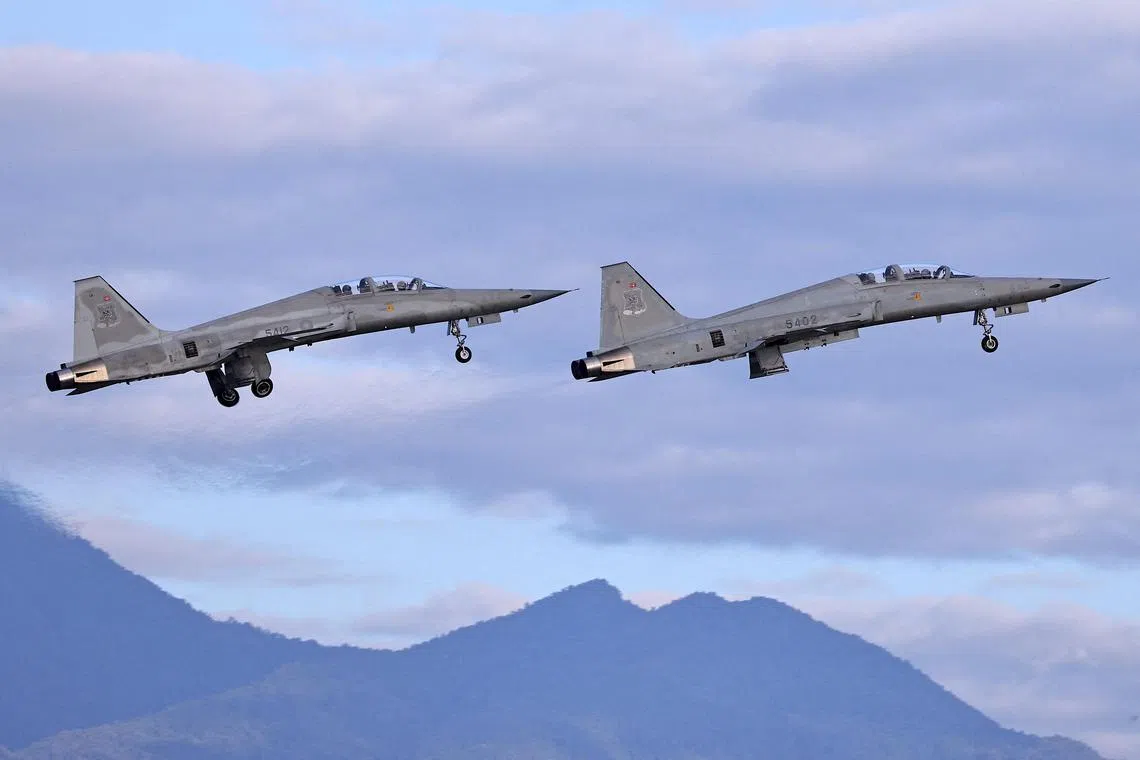US military Bill to authorise up to $13.6b in weapons sales to Taiwan
Sign up now: Get insights on Asia's fast-moving developments

The US$858 billion military policy Bill is expected to pass Congress and be signed into law this month.
PHOTO: REUTERS
WASHINGTON - The United States is set to pass legislation ramping up weapons sales to Taiwan and restricting government use of Chinese semiconductors, strengthening the White House’s hand while excluding measures considered most objectionable to Beijing.
Language in the must-pass annual defence legislation reflects how lawmakers on both sides of the aisle have shown a growing willingness to confront China, despite White House concerns.
The Bill, which is set to pass the House as soon as Thursday, authorises up to US$10 billion (S$13.6 billion) in weapons sales to Taiwan and would boost ties in ways that some in the Biden administration fear undermine President Joe Biden’s ability to set foreign policy.
“The China challenge has become the most significant national security issue our nation has faced in a generation,” said Senator Robert Menendez, a New Jersey Democrat, in a statement.
The Bill does ease back some of the language that would have been more unpalatable to China, including earlier proposals to designate Taiwan a “major non-Nato ally”. That change was made after lobbying by the Biden administration
The Taiwan element in the 2023 National Defence Authorisation Act (NDAA) is based on legislation that Mr Menendez and Senator Lindsey Graham of South Carolina had circulated earlier. Mr Menendez said China’s military build-up, including new technologies and weapons that could be used against Taiwan, means the US needs to step up its support for the island to deter an invasion.
The legislation lands as Mr Biden seeks to balance forceful policies aimed at China, which the US sees as its top strategic competitor, with efforts to contain their competition from spiralling into confrontation. The Senate will take up the Bill next week.
Beijing criticised the Bill on Thursday, with Foreign Ministry spokesman Mao Ning saying the US “should stop arms sales to and military contact with Taiwan, stop creating new factors that could lead to tensions in the Taiwan Strait, stop using Taiwan to contain China and stop moving even further down the wrong and dangerous path”.
In terms of technology, the US has focused in recent years on restricting the kinds of semiconductors China’s companies can procure from the US and its allies, and by boosting its own chip manufacturing.
Washington has also attempted to restrict the use of Chinese-made technology in US devices. To that end, another provision of the NDAA will restrict the use of chips made by certain Chinese companies in items used by the military or other parts of the government.
That section was watered down after a coalition of US businesses objected to language that would have barred the purchase and use of Chinese semiconductors by any federal contractors.
The final version is more permissive regarding the use of semiconductors in equipment unless they are involved in a “critical system”, according to the text of the Bill. The latest version also sets a five-year deadline for compliance, and also allows the executive branch to waive the requirement.
“Scores of companies and associations shared their concerns with the Chamber about the original proposal, and it’s good news that the sponsors made the final version more workable,” said Mr Matthew Eggers, vice-president of cyber-security policy for the US Chamber of Commerce.
Senator John Cornyn, a Texas Republican, said in an interview that the chips provision “definitely sends the signal that we need to not spend” on China for US technology. He said the Taiwan provision was included as deterrence to reduce the chances of China invading Taiwan. Beijing regards Taiwan as a renegade province to be reunited with the Chinese mainland, by force if necessary.
Such an invasion would spark a regional conflict and endanger the semiconductor supply chain as well, he said.
“Anything we can do to deter that is important,” Mr Cornyn said. BLOOMBERG


